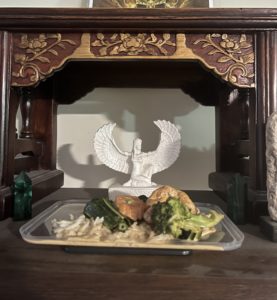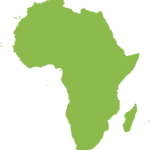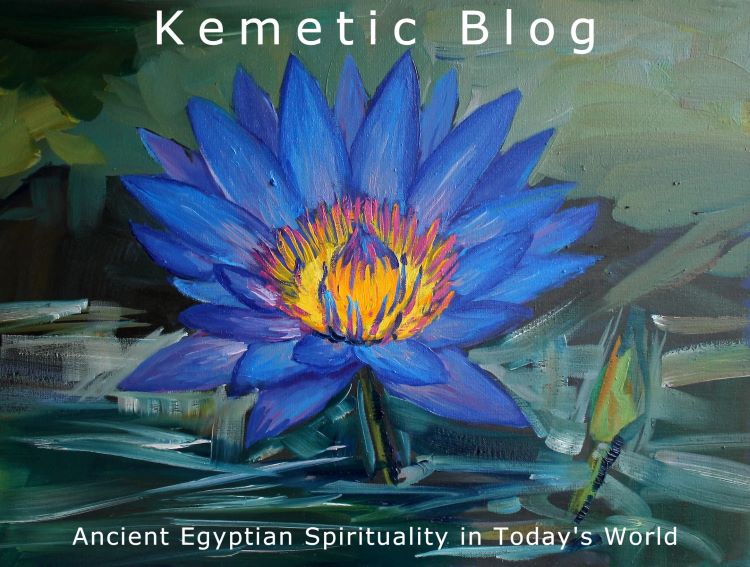
An informal offering to the goddess, Isis. It was a rushed night; note the dust and take-away container lid used! Luckily, Isis is pretty down-to-earth for a goddess and had much bigger concepts on her mind. Image © 2023 Scott Rose
Three weeks before war broke out between Israel and Hamas, I could sense the goddess, Isis was less present around the shrine dedicated to her in my study and when she was there, she was distracted, tense and disappointed about events in which she attempted to intercede but was unsuccessful.
She bore the failure as a troubling personal defeat. I wanted to write a post about it; about how I ordered Thai take-away food and made offerings to help cheer her up, how we began chatting more like friends and less like goddess and devotee, but I simply hadn’t gotten around to writing it. (Work has been increasingly intense and has had some of the other poor nurses in tears, which is another story altogether. We were essentially working in survival-and-avoid-PTSD mode — then attempting to live like normal human beings on our days off. As I would soon discover, others in the world had it far worse off than us).
Once the attacks on Israel occurred and innocent lives were lost, then Israel retaliated, I gained a deeper understanding as to what it was the goddess had been referring to in our conversation. These losses, this defeat, this torture, this death. I grew deeply quiet and reflective once I had all the pieces together in front of me.
It’s like when you’re looking at the road ahead of you while driving. So too does the goddess, Isis along with the other netjeru. They’re looking into realities and possible alternatives, to help steer consciousness in the right direction. This is just one reminder of why the wedjat, or Eye of Horus is so important: they’re looking out for us. The only trouble is the deities do not have full control of the vehicle. It’s important for us to understand that and take responsibility. Like cars, realities can crash and when that happens, it’s not so nice.
In the time I’ve known her, I’ve begun to see more human-like sides to the goddess, Isis.
She shares with me some of her hopes and fears, goals and dreams. I have begun to see some of her vulnerabilities. I think this is because I’ve developed insight into who and what the netjeru actually are, their true nature, and what some of their strengths and limitations might actually be.
The gods feel. They love. They can hurt. They can fail, which hurts even more. I’m not saying this to upset people, I’m saying this because we’ve had an unrealistic expectation of our gods. We think that when something goes wrong, it means they’re not there, they’re not listening, or worse, they don’t exist at all. And yet, they believe in us even when we don’t believe in them. They continue to help us, even when we abandon them.
The ancient Egyptian deities are like influencers from various spiritual media platforms; they can broadcast a powerful message, they can bend space and time, they can nudge us in the right direction but ultimately, they cannot force us to do anything, nor can they override our free will. Everyone on this planet has free will.
The goddess, Isis encourages us to use our free will wisely. To look at how we create reality and again, to take responsibility for our planet. She calls upon Kemetic pagans to make offerings, meditate, and set positive intentions for peace. I recite the 42 positive confessions to instil moral responsibility within myself and to make that frequency — the frequency of Ma’at — more available to all.
We can also send energy to Egypt, who has the power as an intermediary, to be a stabilising factor in the conflict. We can send similar energy to Israel, who has their own responsibility not to commit war crimes. We can send energy to Palestine, and even to Hamas and other key players in this war. This is an opportunity for human beings to affect positive change, which is exactly what the deities are working on right now.
One last reassurance, while the deities have less control of the physical at times, the spiritual and energetic are their domains. Our souls, the immortal aspects of our identities, are in safe hands. That’s why I’ve called this post, in your times of crisis call upon the goddess, Isis and she will be there. Thank you, for reading Kemetic Blog.

Acknowledgement of African Origin The author of Kemetic Blog acknowledges and respects the African ancestral origins of ancient Egypt and recognises the practice of Kemetic paganism as a modern reflection of Traditional African Religion.
©Scott Rose / Kemetic Blog – All Rights Reserved.

No Comments